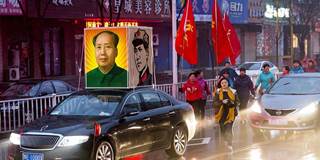China confounded widespread expectations of a sharp slowdown in economic growth in 2016. But the longer China's credit boom continues, the less likely it will be that policymakers can achieve a smooth transition to a sustainable economic path.
LONDON – The year 2016 ends with slightly higher forecasts for global growth and inflation. In part, that reflects expectations of a big new fiscal stimulus in the United States under President Donald Trump. But equally important is the strength of the Chinese economy, with buoyant industrial production fueling a sharp rise in global commodity prices.
That strength has confounded expectations that China’s seven-year credit boom, during which the debt/GDP ratio rose from 150% to 250%, would inevitably end in 2016. Some Western investors foresaw a banking crisis, owing to enormous bad debts; others expected that President Xi Jinping, having consolidated his political position, would introduce structural economic reforms. But almost all non-Chinese economists anticipated a significant slowdown, which would intensify deflationary pressures worldwide.
In fact, the opposite has happened. Central and local government borrowing in China has soared: bank and shadow-bank credit has grown rapidly: and the People’s Bank of China (PBOC) has increasingly issued direct loans to state-owned banks in a maneuver closely resembling monetary finance of government spending.

LONDON – The year 2016 ends with slightly higher forecasts for global growth and inflation. In part, that reflects expectations of a big new fiscal stimulus in the United States under President Donald Trump. But equally important is the strength of the Chinese economy, with buoyant industrial production fueling a sharp rise in global commodity prices.
That strength has confounded expectations that China’s seven-year credit boom, during which the debt/GDP ratio rose from 150% to 250%, would inevitably end in 2016. Some Western investors foresaw a banking crisis, owing to enormous bad debts; others expected that President Xi Jinping, having consolidated his political position, would introduce structural economic reforms. But almost all non-Chinese economists anticipated a significant slowdown, which would intensify deflationary pressures worldwide.
In fact, the opposite has happened. Central and local government borrowing in China has soared: bank and shadow-bank credit has grown rapidly: and the People’s Bank of China (PBOC) has increasingly issued direct loans to state-owned banks in a maneuver closely resembling monetary finance of government spending.